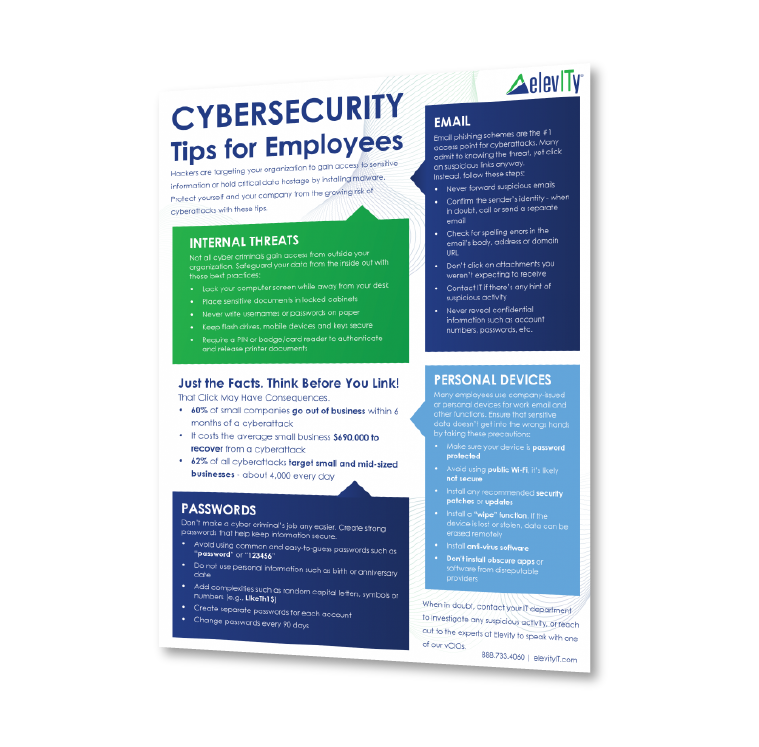IT governance programs are gaining popularity among organizations in all industries as they continue to work to better align IT resources with business strategies. Ensuring compliance with related technology regulations has also become paramount, especially in recent years with so many advancements.
Businesses can find numerous benefits in IT governance, including the elimination of redundancies, proper use of funds, better data protection, comprehensive communication plans and more.
But what is IT governance exactly, and what are some ways you can put it to use in your organization?
IT Governance Defined
In a nutshell, IT governance looks at how IT resources can be best used to create value for an organization by aligning with their objectives and applicable industry laws. It’s a program of best practices and controls that forms the framework of ensuring IT resources are used appropriately to mitigate security risks, increase accountability and safeguard regulatory compliance.
Looking at the organization as a whole, good IT governance factors in the needs of all stakeholders involved — including customers and staff at all levels. Organizations often start with a standardized framework and tailor it from there to support their business objectives and goals.
How Does IT Governance Work?
IT governance typically has a simplified structure in smaller organizations and a more detailed structure in larger ones. However, any organization, especially those that need to comply with financial and/or data accountability regulations, should consider implementing an IT governance program.
The process focuses on combining the major components of IT into one guiding program. When everything harmonizes, more fine-tuning is done when necessary to ensure everything is going according to plan.
The primary components of the IT governance process are:
- IT architecture governance: Guiding how new technologies will be evaluated for possible organizational inclusion
- IT process governance: Directing the development, management and support of IT processes in use
- Enterprise IT governance: Finding the hardware and software that will be used to support the entire organization
- Product development governance: Verifying that the software agrees with the organization’s own products and evolving objectives
Related: The Role of IT Support in Ensuring Data Security and Compliance
Why IT Governance is Important
IT governance is essentially a roadmap that shows what your IT team needs to do in order to assist other parts of your organization in meeting their objectives and following all tech-related laws. By following this roadmap, an organization will produce measurable data that can be used to show progress toward organizational goals and adherence to regulations.
We like to use our own 4S (Strategy, Security, Solutions and Support) approach to Technology Management, and IT governance is a perfect match for this.
Strategy is a crucial element that’s at the heart of IT governance, since IT resources and a business’s goals must be closely aligned. Security is given extra attention while evaluating and implementing current best practices in accordance with data protection and related laws. The right Solutions are selected depending on what the company does and how everything must run. Support is provided by the IT team or outsourced Technology Management provider throughout all stages of the process.
Implementing IT Governance
Putting IT governance in place requires buy-in through all levels of the organization, starting at the top. Make sure everyone is on the same page about moving ahead with this, as IT governance is more than just “a quick idea to try.” We recommend establishing a committee to do the preparation work before bringing along the rest of the team.
Once everyone is on board, it’s time to select the framework on which to build the rest of your program.
Common Frameworks
There are multiple well-known IT governance program frameworks to choose from. Be sure to have your committee evaluate several and select the one that best fits your organization and its goals.
COBIT
The most widely used IT governance framework is the Control Objectives for Information and Related Technology (COBIT). Updated in 2019, COBIT defines the components to build and sustain a governance system. It also includes a focus on enterprise IT governance, which is primarily concerned with value delivery from digital transformation and the mitigation of business risk that results.
Successful adoption of COBIT prompts benefits realization, risk optimization and resource optimization. This framework is aimed at the entire enterprise, not just the IT department, and encompasses all organizational technology and information processing regardless of where this happens within the enterprise.
ITIL
ITIL (Information Technology Infrastructure Library) is a set of best practices on the “hows” of managing and controlling IT service operations.
Coso
COSO, or the Committee of Sponsoring Organizations for the Treadway Commission, concentrates on enterprise risk management and fraud deterrence.
CMMI
CMMI (Capability Maturity Model Integration) uses a scale to determine an organization’s current level in performance, quality and profitability.
FAIR
FAIR (Factor Analysis of Information Risk) is a model that aims its focus toward cybersecurity and operational risks.
ISO/IEC 27002
Last revised in 2022, this standard provides best practice recommendations on information security controls.
The framework you use will depend on your specific goals and how the framework sets the foundation for building your IT governance program. And as you work through this, you’ll find areas where you can improve or where processes could be more efficient for time and money — all while ensuring stable, secure and robust IT solutions company wide.
Further Reading: The 10 Best File Sharing Softwares for Business
What is IT Governance? Tailoring IT Governance to Your Organization
Not sure where to get started? We can help!
We’ll do the research for you to help find the IT governance solution that best fits the needs of your organization. Our virtual Chief Information Officer (vCIO) and IT Strategy services will tailor an IT governance program that meets your business objectives today and even paves the way for future growth. Our modern approach to Technology Management makes this possible.
If you’d like to know more about how our style of Technology Management compares with traditional IT methods, we invite you to click the link below to download our infographic, Traditional IT vs Technology Management, to get the details.








%20cropped.jpg)





